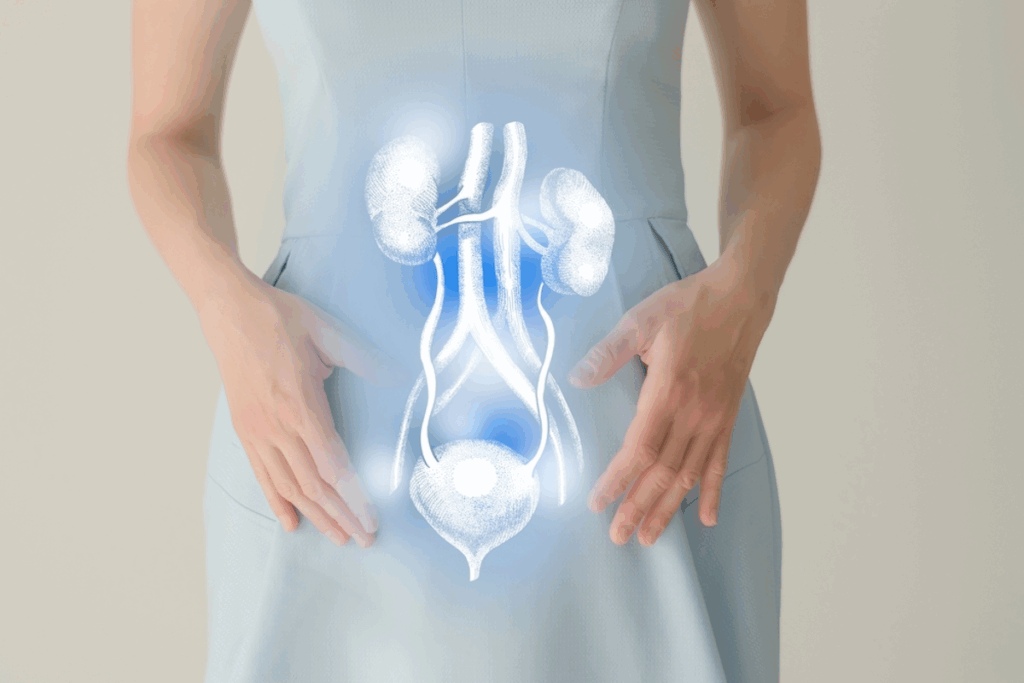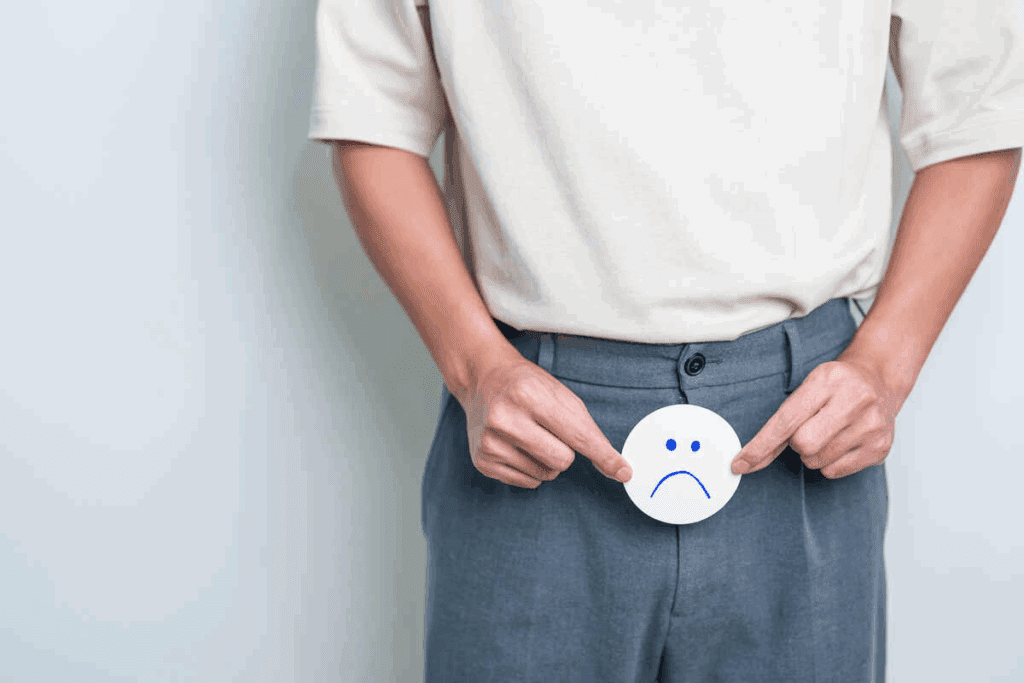
Many people worry about getting UTIs, even more so after sex. Studies have found that sex can raise the risk of UTIs, mainly in women. It’s key to know why this happens and how to avoid it. We’ll look into why UTIs are a concern after sex and how to lower your risk.
Learn how to prevent and recognize bladder infection symptoms after intercourse. Key steps to reduce your risk of a post-sex UTI.
Understanding the Connection Between Sexual Activity and Bladder Infections
Sexual activity is a big reason why women get urinary tract infections (UTIs). Bacteria from sex can get into the urinary tract. This is why UTIs often happen after sex.
To lower this risk, it’s good to urinate after sex. Knowing what increases UTI risk can also help prevent them.
Being informed about UTI causes and prevention can help keep your urinary system healthy. This way, you can avoid UTIs and stay healthy.
Can Bladder Infection Be Caused by Intercourse? The Scientific Evidence
Intercourse can raise the risk of urinary tract infections (UTIs) in women. The act of sex can push bacteria into the urinary tract.
The Link Between Sex and UTIs
Studies link more sex to higher UTI risks. To lower this risk, keep clean, pee after sex, and use protection.
How Bacteria Travel During Sexual Activity
Sex can make you more likely to get a urinary tract infection (UTI). This is because bacteria can get into your urinary tract. E. coli is a common cause of UTIs.
To lower your risk, keeping clean is key. Make sure to pee after sex. This helps wash out any bacteria.
Knowing why UTIs happen and how to prevent them is important. This knowledge can help you avoid these infections.
How Soon After Intercourse Can a UTI Develop?

Urinary Tract Infections (UTIs) can happen at any time. But, the risk goes up after sex because bacteria can get into the urinary tract. Symptoms of UTI can start from 24 to 48 hours after sex.
Many things can make you more likely to get a UTI after sex. These include how clean you stay, the bacteria around, and how your body reacts. Knowing these can help prevent UTIs.
To lower UTI risk, keep yourself clean. Urinate after sex and take care of your genital area. Also, watch for UTI signs like burning while peeing, needing to pee a lot, and belly pain. Catching UTIs early can make treatment easier.
Immediate Post-Intercourse Prevention Strategies
Urinating after sex is key to avoiding UTIs. It helps clear bacteria from the urinary tract. Also, keeping the genital area clean with mild soap and water can lower UTI risk.
More steps can help too. Drinking lots of water helps flush out bacteria. It’s also wise to avoid harsh or scented products that can irritate the area.
Essential Hygiene Practices Before and After Intercourse
Keeping yourself clean is key to avoiding UTIs. Here are some important steps to take:
Before Intercourse
- Shower or bathe before you have sex
- Use mild soap and lukewarm water to clean your genital area
After Intercourse
- Go to the bathroom right away to get rid of bacteria
- Keep your genital area clean
By following these simple steps, you can lower your chance of getting a UTI.
Can You Catch a UTI From Your Partner?

UTIs are common infections that can affect anyone. But, can you catch a UTI from your partner? The answer is yes, it’s possible.
UTIs are caused by bacteria, and these bacteria can be transferred from one person to another. This can happen through sexual contact, sharing towels, or even touching contaminated surfaces.
It’s important to note that UTIs are not sexually transmitted infections (STIs). They are not caused by viruses or parasites, but by bacteria. So, while you can catch a UTI from your partner, it’s not the same as catching an STI.
Preventing the spread of UTIs is key. Here are some tips to help you:
- Practice good hygiene: Wash your hands regularly, and make sure to clean your genital area thoroughly.
- Use protection: Condoms can help reduce the risk of bacterial transfer during sexual activities.
- Stay hydrated: Drinking plenty of water helps flush out bacteria from your urinary tract.
- Practice safe sex: Avoid sharing sex toys or engaging in activities that may increase the risk of bacterial transfer.
It’s also important to get tested for UTIs if you have symptoms. Early detection and treatment can help prevent complications and reduce the risk of passing the infection to your partner.
Remember, while it’s possible to catch a UTI from your partner, it’s not the only way to get one. Other factors, such as poor hygiene, certain medical conditions, or using certain types of birth control, can also contribute to UTI development.
By following these prevention tips and staying informed, you can reduce the risk of catching a UTI from your partner and maintain a healthy urinary tract.
Preventing the Spread of UTIs
Preventing the spread of UTIs is essential for both you and your partner. By practicing good hygiene, using protection, staying hydrated, and practicing safe sex, you can reduce the risk of catching a UTI from your partner and prevent passing it to them.
Remember, UTIs are common and can affect anyone. By taking preventive measures and staying informed, you can protect your urinary health and maintain a healthy relationship with your partner.
The Impact of Contraceptives and Lubricants on Infection Risk
Some contraceptives can raise the chance of getting urinary tract infections (UTIs). Spermicides are a big concern because they can upset the balance of good bacteria in the vagina.
Diaphragms might also increase UTI risk. To lower this risk, keeping clean and exploring other birth control methods is key.
Living a healthy life, like eating right and staying active, can also cut down UTI risk.
Dietary Changes and Supplements for Bladder Health
Making smart food choices is key to keeping your bladder healthy. Adding certain foods and supplements to your diet can boost urinary tract health.
Beneficial Foods
Some foods are great for your bladder. These include:
- Berries such as blueberries, strawberries, and raspberries, which are rich in antioxidants.
- Leafy greens like spinach and kale, which are packed with nutrients.
Supplements for Bladder Health
Along with food changes, some supplements can help prevent UTIs. These include:
- Cranberry supplements, which may help prevent bacteria from sticking to the bladder walls.
- Probiotics, which support a healthy gut microbiome.
By adding these foods and supplements to your routine, you can help keep your bladder healthy. This reduces the chance of UTIs.
Special Considerations for High-Risk Groups
Groups like post-menopausal women and pregnant women need special care for UTI prevention. They face a higher risk of urinary tract infections due to changes in their bodies and hormones.
Post-Menopausal Women and Hormonal Factors
Post-menopausal women are more likely to get UTIs because of lower estrogen levels. Estrogen keeps the urinary tract healthy by supporting good bacteria and keeping vaginal tissue strong. Without enough estrogen, the vaginal tissue gets thinner and more acidic, inviting bad bacteria.
Estrogen replacement therapy can help lower UTI risk. Using vaginal estrogen creams or rings also helps restore vaginal balance.
Pregnant Women and UTI Prevention
Pregnant women are also at higher risk for UTIs. Pregnancy changes, like a bigger urinary tract and weaker bladder, increase this risk. Untreated UTIs during pregnancy can cause serious problems, making prevention and early detection key.
Pregnant women should focus on UTI prevention. This includes staying hydrated, urinating after sex, and keeping clean. Regular prenatal visits can also help catch and treat UTIs early.
Individuals with Recurring Infections
Those with recurring UTIs need a more detailed prevention plan. This might include low-dose antibiotic prophylaxis, vaginal estrogen therapy for post-menopausal women, and making lifestyle changes like diet and hygiene.
It’s vital for those with recurring UTIs to work with their healthcare provider. Together, they can create a prevention plan that fits the individual’s needs, medical history, and lifestyle.
Medical Interventions for Chronic Post-Intercourse UTIs
For those with recurring UTIs, medical help is key. One way is using prophylactic antibiotics.
Prophylactic antibiotics are taken after sex to stop UTIs. They aim to kill bacteria that might cause infections. This helps lower the chance of getting UTIs again.
When to Consider Prophylactic Antibiotics
If you get UTIs often, you might need prophylactic antibiotics. This usually means having two or more UTIs in six months.
Types of Prophylactic Antibiotics
There are several antibiotics for prevention, like trimethoprim, nitrofurantoin, and fosfomycin. The right one depends on your health history and the bacteria causing the UTIs.
Learning about prophylactic antibiotics and other treatments helps prevent UTIs. It’s a step towards better health.
Conclusion: Creating Your Personal UTI Prevention Plan
By following these guidelines, you can lower your risk of UTIs. This helps keep your urinary tract healthy. Make these habits a part of your daily life.
FAQ
Q: What causes UTIs after intercourse?
A: UTIs after sex happen when bacteria get into the urinary tract during sex.
Q: How can I prevent UTIs after intercourse?
A: To avoid UTIs, pee after sex, keep clean, and use lubricants.
Q: Are women more prone to UTIs than men?
A: Yes, women get UTIs more often because their urethra is shorter. This makes it easier for bacteria to get to the bladder.
Q: Can spermicides increase the risk of UTIs?
A: Yes, spermicides can raise UTI risk by changing the natural bacteria balance.
Q: How soon after intercourse can UTIs develop?
A: UTIs can start within 24-48 hours after sex.
Q: What are the symptoms of a UTI?
A: UTI symptoms include burning while peeing, needing to pee a lot, and stomach pain.
Q: Can UTIs be prevented with diet and lifestyle changes?
A: Yes, drinking lots of water and staying clean can help prevent UTIs.
Q: Are there any medical treatments available for UTIs?
A: Yes, doctors often give antibiotics to treat UTIs.
Q: Can I reduce my risk of UTIs by using certain products?
A: Yes, using lubricants and staying clean can lower UTI risk.
Q: How can I tell if I have a UTI?
A: If you pee and it burns, pee a lot, or have stomach pain, you might have a UTI. See a doctor for a check-up and treatment.
Q: Can UTIs be a sign of an underlying health issue?
A: Yes, if you keep getting UTIs, it could mean there’s a bigger health problem, like a urinary tract issue or a weak immune system.
Q: How can I prevent UTIs during sex?
A: To stop UTIs during sex, stay clean, use lubricants, and pee after sex.
Q: What are some alternative methods for preventing UTIs?
A: To avoid UTIs, try cranberry supplements, stay clean, and avoid foods that might cause UTIs.
Q: Can UTIs be a sign of a more serious health issue?
A: Sometimes, UTIs can mean a bigger health problem, like kidney disease or diabetes. If you keep getting UTIs or they’re really bad, see a doctor.
References
National Center for Biotechnology Information. How to Prevent Bladder Infections After Intercourse Many. Retrieved from https://pmc.ncbi.nlm.nih.gov/articles/PMC2324148/



































